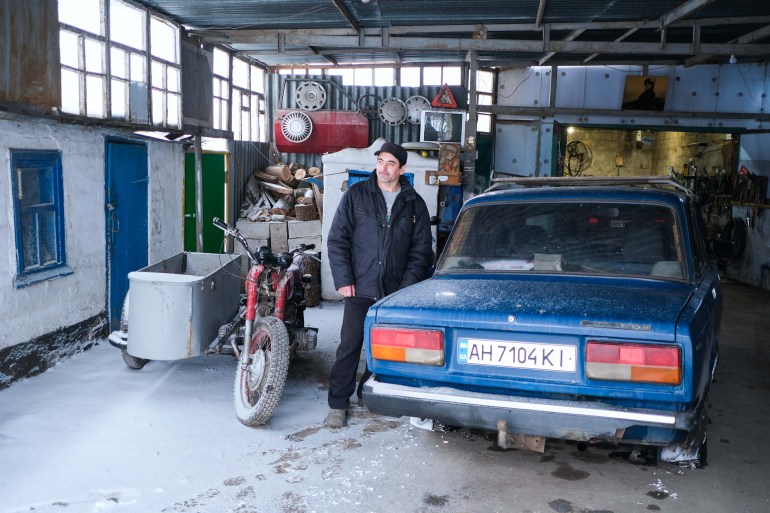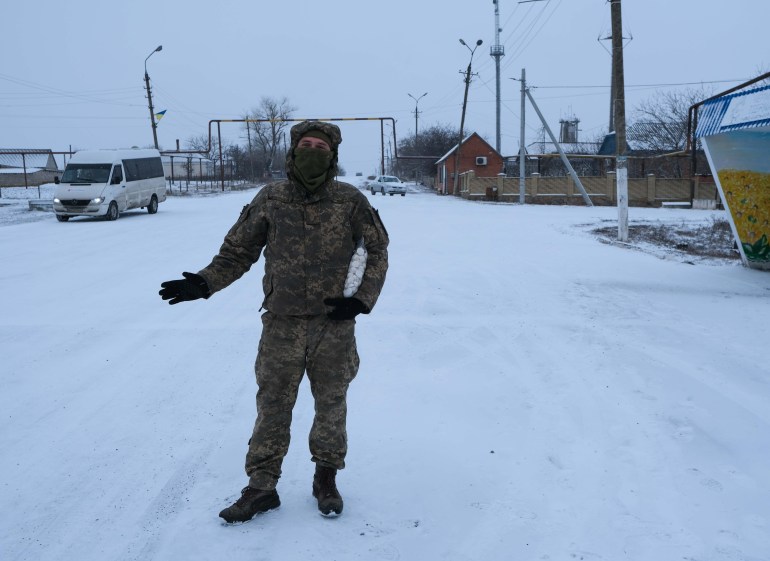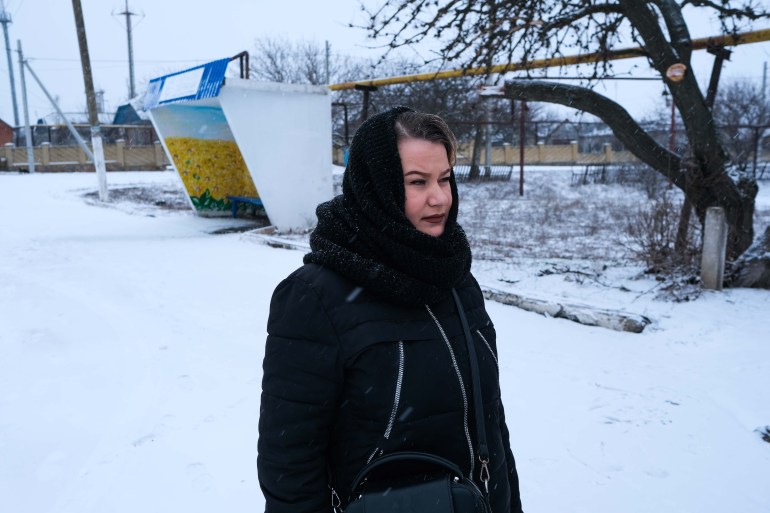Only first names have been used in some instances to protect identities.
Chermalyk, Ukraine – Sergei, a mild-mannered mechanic in his 40s, pours himself another shot of vodka and stares into the distance.
It has been a Sunday lunch filled with plenty of food and laughter, but the conversation has now moved on to politics, a subject in which he has little interest.
He lives on the faultline of an escalating crisis between Russia and Ukraine.
On the other side of a small river, a few hundred metres from his house is a territory occupied by Russian-backed separatists.
But the atmosphere in Chermalyk is a far cry from the heavily fortified network of trenches that snake along the 500km (310-mile) line of separation between the Ukrainian army and Russian-backed separatists in the Donetsk and Luhansk regions.
In the trenches, any movement is closely monitored, and one wrong move could invite sniper fire or heavy shelling from the enemy.
In recent weeks, Russia has amassed more than 100,000 soldiers along its borders with Ukraine prompting United States President Joe Biden to announce that there is a “distinct possibility” that Russia will invade Ukraine next month.
The US and its allies have also responded by threatening economic sanctions and an increased military presence in the region, unconvinced by Russia’s insistence that it does not want a war.
 Russia has amassed more than 100,000 soldiers along its borders with Ukraine [Nils Adler/Al Jazeera]
Russia has amassed more than 100,000 soldiers along its borders with Ukraine [Nils Adler/Al Jazeera]But walking around the sleepy village of Chermalyk, you would never guess that this was at the epicentre of the world’s most talked-about conflict.
It is possible to peer across the river at the windswept winter landscape under the separatists’ control. Locals even talk of going fishing during the summer months on the other side.
A battalion of Ukrainian soldiers, called the Sons of Oden, is stationed at Chermalyk, but their presence is low-key, and they can wander around the village to buy groceries.
Many residents have an indifferent attitude to the threat of an invasion.
“I don’t think our situation would change,” says Sergei, a former teacher who has been unemployed since most of his students left in 2014, when Russia annexed Crimea.
Residents describe being cut off and forgotten by the rest of the country.
“Support from the state has completely dried up,” said Ludmilla, a shop owner. “It has left us exhausted.”
 Ukrainians on the front line are carrying on with life as best they can, as the world talks of an imminent war [Nils Adler/Al Jazeera]
Ukrainians on the front line are carrying on with life as best they can, as the world talks of an imminent war [Nils Adler/Al Jazeera]The village has also been physically isolated after a nearby bridge was badly damaged during heavy fighting in 2014-15. Buses bound for the nearest city of Mariupol used to leave every hour, now it is just once a day.
The village has also suffered a brain drain. Engineers who worked at nearby factories left after the 2014 conflict.
Unemployed and living off fruit and vegetables they grow in their gardens, locals resort to stealing firewood in the winter from the surrounding forest to keep warm.
“We are not scared of a change in authority,” said Natalya, a pensioner who lives by the riverbank. “Perhaps gas prices would be lower if the separatists came here.”
“For us, things wouldn’t change,” said Sergei, the teacher. “We are unemployed and live off the land.”
However, tension simmers beneath this seemingly relaxed atmosphere.
In the evenings, stray bullets occasionally strike houses and shelling regularly rattles the windows of riverside homes.
As Natalya walks back to her house from the garden, a gust of wind slams the front door shut; she jumps and lets out a scream.
“You see, I am always scared when I hear noises,” she said.
 A battalion of Ukrainian soldiers, called the Sons of Oden, is stationed at Chermalyk, but their presence is low-key [Nils Adler/Al Jazeera]
A battalion of Ukrainian soldiers, called the Sons of Oden, is stationed at Chermalyk, but their presence is low-key [Nils Adler/Al Jazeera]Volodymyr, a soldier stationed nearby, has noticed an increase in activities on the other side of the river, including drones and heavy vehicles.
“There is definitely something happening now,” he said.
Nataliya, a resident in her early 20s, has been reminded of the fighting in 2014-15. She is pregnant and worries about the safety of her unborn child.
“My family know where to run and hide,” she said. “We have saved some money so that we can run to a big city, like Kyiv.”
An escalation in tensions also threatens to expose a deeply fractured political divide in the village.
Behind closed doors, people can voice their opinions; some side with Ukraine and some with the Russian-backed separatists.
But in streets or shops, people stick to small talk.
“I am afraid to talk openly,” says teacher Sergei. “If I do, people could find me and kill me.”
But many feel like Sergei, the mechanic, who just wants a better life without the looming threat of conflict.
“I just wish nations would stop fighting each other,” he said. “I would rather they compete on who has the best living conditions.”
 Natalya, a pensioner who lives by the riverbank, says she is not afraid of a change in authority [Nils Adler/Al Jazeera]
Natalya, a pensioner who lives by the riverbank, says she is not afraid of a change in authority [Nils Adler/Al Jazeera]Stay connected with us on social media platform for instant update click here to join our Twitter, & Facebook
We are now on Telegram. Click here to join our channel (@TechiUpdate) and stay updated with the latest Technology headlines.
For all the latest World News Click Here
